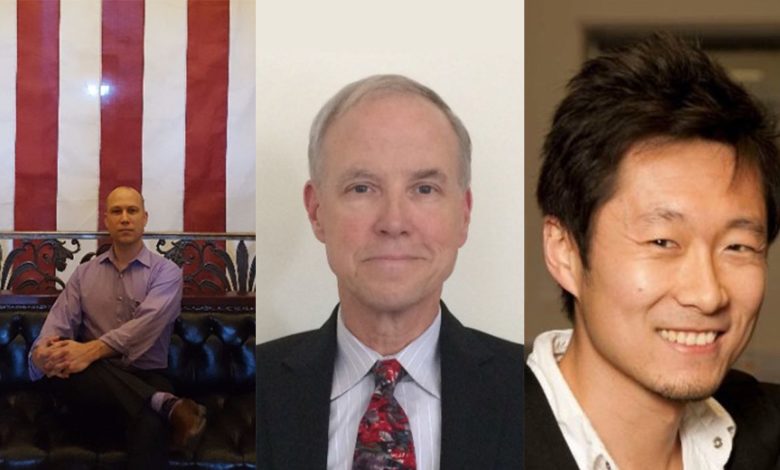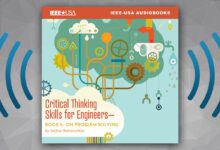
In September 2016, when Jonathan Rayner was to begin an IEEE-USA Engineering and Diplomacy Fellowship at the U.S. Department of State, he looked forward to contributing his years of technical expertise, while also learning how the government works.
His expectations were fulfilled, although not at the State Department. In January, the new administration almost immediately ordered a hiring freeze—after which, Capitol Hill quickly recruited him.
“Being on the Hill has been a fantastic opportunity,” Rayner says. “Participating in the legislative branch is a unique proposition, because you gain a different perspective, when you have to examine the impacts of policy from all viewpoints.”
The IEEE Member has been working in the office of Representative James Langevin, D-R.I. — as it turned out, an ideal fit for everyone concerned. Rayner, who was previously with Lockheed Martin for 10 years, easily transferred his skill sets to support Rep. Langevin’s efforts on cybersecurity. The legislator is a senior member of both the House Armed Services Committee and the House Committee on Homeland Security, and also co-founded the Congressional Cybersecurity Caucus.
Rayner’s labors for Rep. Langevin this past year have ranged from drafting legislation to writing speeches. “Speechwriting is an opportunity to work with the Congressman, to advance policy in areas on the cutting edge of technology,” says Rayner. “Eventually, they may serve as the basis for future legislation.”
“There’s a dearth of technical knowledge on the Hill, and I’ve been fortunate to work for a member who values the contributions of science and technology to policy,” observes this IEEE-USA Fellow.
IEEE Members Mark Olive and Yan Zheng, the two other 2016-17 IEEE-USA Congressional Science and Technology Fellows, agree with Rayner that learning how government works, especially about policy, also inspired each of them to apply for the fellowship.
Olive, who has worked 35 years in aviation, 28 of them in the military, wanted to understand how policy is made, especially how decisions affecting policy are reached. Zheng, who received his Ph.D. in 2012, had been working in Washington for Booz Allen Hamilton on its work for the Defense Advanced Research Projects Agency (DARPA). He had a longstanding interest in policy—particularly, how established policies for research and STEM education affect the flow of innovation and the demands for a highly skilled workforce.
Upon starting their fellowships in September 2016, both Olive and Zheng interviewed with a range of offices on Capitol Hill. Olive was drawn to the staff of Senator Mike Rounds, R-S.D., because Rounds is on the Senate Armed Services Committee (ASC)—and Olive was confident his combined engineering and military expertise would be useful. As it turned out, one of Olive’s key responsibilities became advising the ASC’s Defense Policy Team—with special emphasis in cybersecurity, readiness and acquisition.
Zheng says he chose the office of Senator Chris Coons, D-Del., because of the legislator’s openness and his wide-ranging technology interests—as well a reputation for giving fellows on his staff the freedom to recommend policies.
All three 2016-17 Congressional Fellows agree their assignments were especially pleasant and productive because the legislators they worked for encourage bipartisan cooperation.
“What inspired me about Senator Coons was that he doesn’t introduce any legislation without a Republican co-sponsor,” says Zheng. “This can be very challenging, but also very revealing to someone like me, who came to Congress from the outside. I’ve learned to put myself in someone else’s shoes, and explain the need for a piece of legislation in a way that makes it both clear and acceptable to the other side.”
Rayner points to Rep. Langevin’s efforts concerning climate change and how it will affect the United States military. “An amendment that stated climate security is national security was passed this summer with strong bipartisan support. It was a momentous step that Congress has now recognized the impact climate change will have on military bases everywhere,” he says.
Despite their positive experiences regarding a bipartisan approach to crafting legislation, Olive and Zheng—who began their fellowships during the Obama administration—observed marked changes after the Trump administration took over.
“The lack of manpower in the new administration is remarkable,” says Olive. “There aren’t enough people in the executive branch agencies to handle the traffic, because they haven’t been confirmed or hired. In my experience, I couldn’t make contact with people in Commerce, Transportation, or Energy who could answer my questions.” He adds that often, to get the information he needed, he contacted D.C.-area think tanks.
Zheng says that because much of Sen. Coons’ efforts center around nurturing American innovation and manufacturing, across-the-aisle support helped to make his fellowship easier. Among his many duties, he was responsible for setting up frequent events on the Hill, with panelists from both industry and academe, on topics that other legislators and their staffs would be interested in. These ranged from biopharmaceutical manufacturing to workforce development.
How valuable has their experience as IEEE-USA Government Fellows been to them?
“I wish the fellowship was longer than a year,” says Jonathan Rayner. In fact, because of his late start in Rep. Langevin’s office, Rayner extended the duration of his term through the end of this year.
Mark Olive says he learned valuable lessons that he’s already using in the consulting business he started since returning home in September to Wichita, Kansas. He is now providing aircraft certification services for small-cap companies that don’t find it cost-effective to maintain their own departments.
“Since my fellowship, I have a much greater appreciation for the number of opportunities available to professionals who will take the time to understand the intricacies of providing regulatory support services to industry,” he says.
Yan Zheng has returned to Booz Allen Hamilton in Washington, and expects that the important new networks he built while on Capitol Hill will be very helpful in his new job. He is leading an effort for the firm that supports one of DARPA’s latest initiatives, which he describes as “a large-scale R&D collaboration of academia and of defense and commercial technology companies to address the future of electronics in a post-Moore’s Law world.”
Zheng says he’s grateful for the support from IEEE-USA, and calls the Government Fellowships “a good way to break down barriers and stereotypes.
“Most people on the Hill are lawyers—not science majors,” he adds. “In our society, the quiet, nerdy engineering stereotype is harmful—especially in a field where talking to and meeting with people is so important. More interaction with engineers is needed. It shouldn’t be daunting to call someone at a national lab and fear a technical conversation.”
NOTE: Tom Colvin was the 2016-17 IEEE-USA Engineering & International Development Fellow. Colvin served in the United States Agency for International Development. He was not available for an interview.
Helen Horwitz is an award-winning freelance writer who lives in Albuquerque, N.M. She was with IEEE from 1991 through 2011, the first nine as Staff Director, IEEE Corporate Communications.






